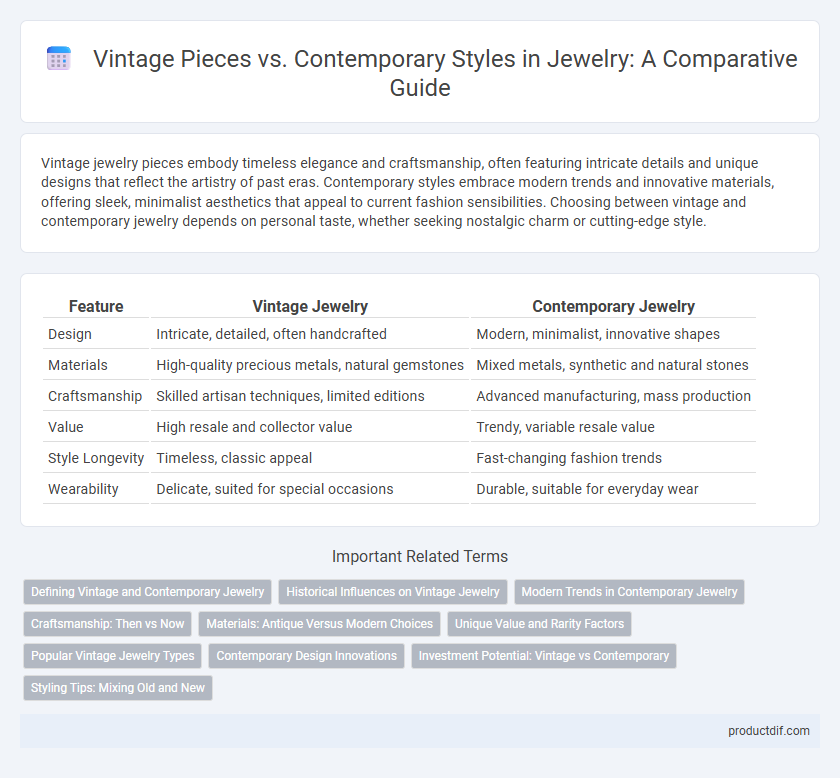Vintage jewelry pieces embody timeless elegance and craftsmanship, often featuring intricate details and unique designs that reflect the artistry of past eras. Contemporary styles embrace modern trends and innovative materials, offering sleek, minimalist aesthetics that appeal to current fashion sensibilities. Choosing between vintage and contemporary jewelry depends on personal taste, whether seeking nostalgic charm or cutting-edge style.
Table of Comparison
| Feature | Vintage Jewelry | Contemporary Jewelry |
|---|---|---|
| Design | Intricate, detailed, often handcrafted | Modern, minimalist, innovative shapes |
| Materials | High-quality precious metals, natural gemstones | Mixed metals, synthetic and natural stones |
| Craftsmanship | Skilled artisan techniques, limited editions | Advanced manufacturing, mass production |
| Value | High resale and collector value | Trendy, variable resale value |
| Style Longevity | Timeless, classic appeal | Fast-changing fashion trends |
| Wearability | Delicate, suited for special occasions | Durable, suitable for everyday wear |
Defining Vintage and Contemporary Jewelry
Vintage jewelry refers to pieces that are at least 20 to 30 years old, often characterized by unique craftsmanship, historical design elements, and materials that reflect the specific era they originate from. Contemporary jewelry, in contrast, features modern designs that emphasize minimalism, innovative materials, and current fashion trends, appealing to those seeking fresh and versatile aesthetics. Understanding the defining traits of vintage and contemporary jewelry helps collectors and buyers make informed choices based on style preference, rarity, and investment potential.
Historical Influences on Vintage Jewelry
Vintage jewelry showcases intricate craftsmanship influenced by distinct historical periods such as the Victorian, Edwardian, and Art Deco eras, reflecting cultural and artistic movements through detailed motifs and materials. Each vintage piece often carries unique storytelling elements, using gemstones like sapphires, emeralds, and diamonds expertly set in precious metals such as gold and platinum. These historical influences create timeless designs that contrast with the minimalist and modern aesthetics typical of contemporary styles, appealing to collectors and enthusiasts seeking authenticity and heritage.
Modern Trends in Contemporary Jewelry
Modern trends in contemporary jewelry emphasize minimalist designs, geometric shapes, and sustainable materials, reflecting a shift toward personalized and eco-conscious fashion. Unlike vintage pieces that often showcase intricate craftsmanship and historical significance, contemporary styles prioritize versatility and innovative techniques such as 3D printing and mixed media. The integration of lab-grown diamonds and recycled metals highlights the industry's commitment to ethical sourcing and environmental responsibility.
Craftsmanship: Then vs Now
Vintage jewelry showcases intricate handcraftsmanship with techniques such as hand engraving, filigree, and hand-setting of gemstones, reflecting meticulous artisan skills from the past. Contemporary jewelry often benefits from advanced technologies like CAD design and 3D printing, enabling precision and innovative forms while maintaining high standards of quality. The contrast highlights a shift from labor-intensive, individually crafted pieces to a blend of traditional artistry and modern efficiency in today's designs.
Materials: Antique Versus Modern Choices
Vintage jewelry often features materials such as yellow gold, sterling silver, and gemstones like emeralds, sapphires, and rubies that have naturally aged over time, providing unique patinas and character. Contemporary styles favor innovative materials including titanium, stainless steel, and synthetic gems like lab-created diamonds, offering durability and eco-friendly options. The contrast between antique metals with hand-crafted details and sleek modern alloys highlights evolving trends in jewelry design and material science.
Unique Value and Rarity Factors
Vintage jewelry pieces offer unparalleled uniqueness and rarity, often crafted with techniques and materials no longer available, making each item a rare artifact of history. Contemporary styles emphasize modern design trends and innovative materials, but lack the intrinsic historical value that defines vintage treasures. Collectors and enthusiasts prize vintage jewelry for its distinctive character and scarcity, which significantly enhance its long-term value and appeal.
Popular Vintage Jewelry Types
Popular vintage jewelry types include Art Deco geometric designs, Victorian intricate filigree pieces, and Retro bold statement accessories. These vintage styles feature unique craftsmanship and historical significance, distinguishing them from contemporary minimalist trends. Collectors often seek gemstones like sapphires, rubies, and diamonds set in yellow gold or platinum, which are hallmark materials of vintage collections.
Contemporary Design Innovations
Contemporary jewelry design innovations emphasize the fusion of technology and artistry, utilizing 3D printing and computer-aided design (CAD) to create intricate, customizable pieces impossible with traditional methods. Modern materials such as titanium, resin, and sustainable metals expand the palette beyond classic gold and silver, offering durability and unique aesthetics that appeal to eco-conscious consumers. The shift towards minimalist and geometric forms reflects current trends, blending function with avant-garde fashion statements in wearable art.
Investment Potential: Vintage vs Contemporary
Vintage jewelry often holds significant investment potential due to its rarity, historical value, and unique craftsmanship, which can appreciate over time and attract collectors. Contemporary styles, while trendy and innovative, may not retain long-term value as market demand fluctuates with fashion trends. However, certain luxury brands and limited-edition modern designs can also serve as strong investments when supported by brand reputation and exclusivity.
Styling Tips: Mixing Old and New
Vintage jewelry adds timeless elegance and unique character to contemporary outfits, creating a distinctive style statement. Combine delicate antique rings or brooches with minimalist modern attire to enhance contrast and spotlight each piece. Balance bold, vintage statement necklaces with sleek, modern lines for a harmonious blend of old-world charm and current trends.
Vintage pieces vs contemporary styles Infographic

 productdif.com
productdif.com